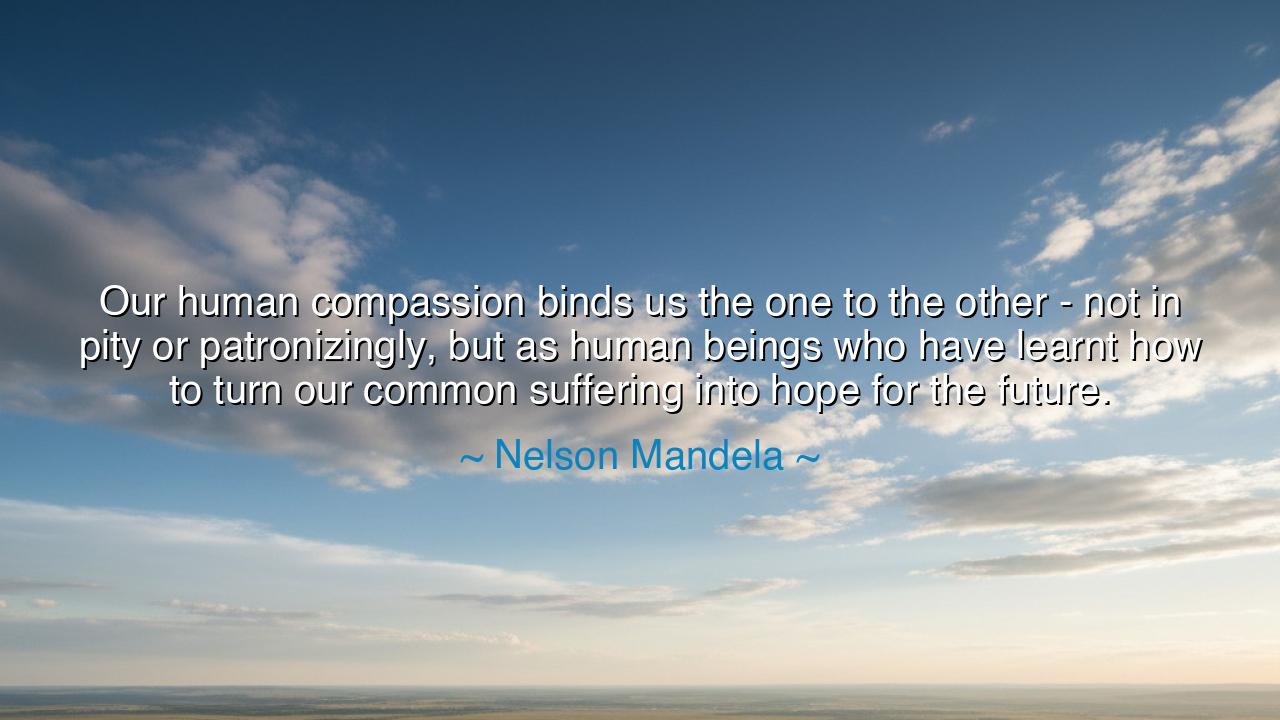
Our human compassion binds us the one to the other - not in pity
Our human compassion binds us the one to the other - not in pity or patronizingly, but as human beings who have learnt how to turn our common suffering into hope for the future.






In the heart of every human being, there exists a profound connection—a bond forged through the shared experiences of suffering and joy. Nelson Mandela’s words, “Our human compassion binds us the one to the other - not in pity or patronizingly, but as human beings who have learned how to turn our common suffering into hope for the future,” speak to the essence of unity and solidarity. They remind us that, while we may each walk our own path, it is through our common suffering and the ability to transform that suffering into hope that we find true strength and a shared purpose. Compassion, not born of pity, but of shared humanity, is the thread that weaves us together in a tapestry of strength and hope.
The ancients understood the power of compassion as a unifying force. Aristotle, in his writings on ethics, spoke of the importance of friendship and mutual respect in human society. To him, true friendship was not merely the exchange of favors, but the bond between individuals who recognized their shared humanity and common experiences. This bond, rooted in compassion, allowed them to grow together, to learn from one another, and to support each other through life’s challenges. Aristotle understood that compassion was not a mere feeling of sympathy, but a deep understanding that we are all connected in our struggles and in our hopes for a better future.
This same understanding of compassion is reflected in the ancient tales of heroes who, though often faced with immense suffering, turned that suffering into a force for good. Consider the Greek hero Heracles, who was tasked with completing twelve impossible labors. Though each labor was fraught with danger and hardship, Heracles faced them not with resentment, but with an understanding that his suffering was part of a greater purpose. In enduring these trials, he transformed his personal pain into strength, not only for himself but for his people. Through suffering, he found a deeper connection to humanity, one that was forged in his willingness to rise above his trials for the benefit of others. This is the very essence of Mandela’s wisdom—that compassion is born from our ability to transcend personal suffering for the sake of a shared future.
Mandela’s own life is a testament to the power of suffering turned into hope. Imprisoned for 27 years under the brutal regime of apartheid, Mandela experienced unimaginable pain and loss. Yet, rather than succumb to bitterness, he used his suffering to fuel his commitment to freedom, equality, and the restoration of human dignity. He understood that true compassion was not about feeling sorry for others, but about using the shared human experience of suffering to bring about change. His vision of a free and equal South Africa was not born out of pity, but from the profound realization that all humans are bound by their common struggles, and that only through solidarity could they hope to rise above them.
This lesson of shared humanity is crucial for us today. We live in a world filled with divisions—racial, cultural, and ideological. Yet, as Mandela teaches us, our common suffering is the bond that unites us. We all experience pain, loss, and disappointment, but it is in how we respond to this suffering that we shape the world. When we allow compassion to guide our actions, we transform our struggles into strength, and our shared pain becomes a foundation for hope and progress. Compassion does not seek to diminish the suffering of others through pity, but to recognize the strength in each person’s experience and the hope that can be cultivated through shared understanding.
The lesson in Mandela’s words is clear: compassion is not an act of charity, nor is it a feeling of superiority over those who suffer. It is the recognition that we are all in this together, bound by our common struggles, and that by embracing this shared humanity, we can transform our suffering into a force for change. This compassion is the true source of strength—it is what allows us to endure the harshest trials and still move forward with hope in our hearts.
In our own lives, we must practice this compassion. We must recognize the pain and struggles of others as reflections of our own experiences. We must use our shared humanity as the basis for building stronger, more compassionate communities. Mandela’s wisdom teaches us that when we stop seeing others through the lens of pity and instead see them through the lens of solidarity, we unlock the true potential for healing, growth, and progress. By doing so, we become agents of change, turning our common suffering into the hope that will shape a better future for all.






AAdministratorAdministrator
Welcome, honored guests. Please leave a comment, we will respond soon